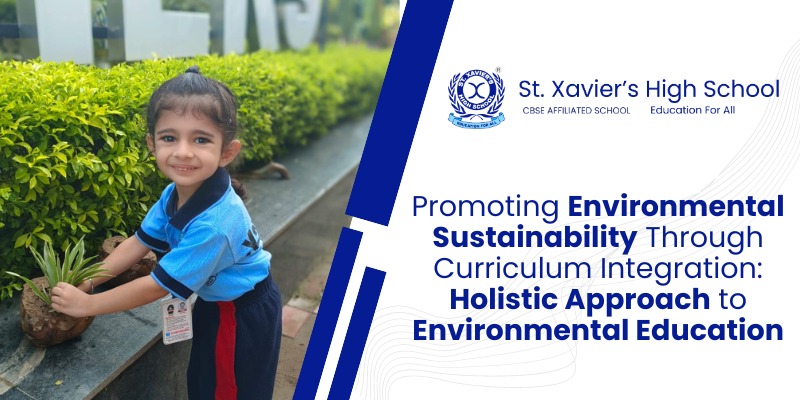Introduction:
As One of the Best-Rated Schools in Noida, St. Xavier’s High School recognizes the urgent need to address environmental challenges and instill a sense of responsibility for environmental stewardship among its students. Through a holistic approach to environmental education, the school integrates environmental sustainability principles into its curriculum, fostering a culture of environmental awareness, action, and advocacy among its student body.
Understanding Environmental Sustainability
At the heart of the School’s approach to environmental education is a deep understanding of environmental sustainability and its implications for present and future generations. Students learn about the interconnectedness of ecological systems, the impact of human activities on the environment, and the importance of adopting sustainable practices to mitigate climate change, conserve natural resources, and protect biodiversity.
Through interdisciplinary lessons, project-based learning activities, and real-world case studies, students gain a comprehensive understanding of environmental issues and develop critical thinking skills to analyze complex environmental problems and explore innovative solutions.
Integration of Environmental Themes Across the Curriculum
The School takes a multidisciplinary approach to environmental education, integrating environmental themes and principles across various subjects and disciplines. Whether it’s science, social studies, language arts, or mathematics, students have opportunities to explore environmental concepts, issues, and solutions in the context of their academic studies.
For example, in science classes, students learn about ecosystems, climate change, and renewable energy sources, conducting experiments and investigations to understand scientific principles underlying environmental phenomena. In social studies classes, students examine the socio-economic factors driving environmental degradation and explore historical and cultural perspectives on environmental conservation and sustainability.
Through literature and language arts classes, students engage with environmental literature, poetry, and essays, gaining insights into human relationships with nature and the ethical dimensions of environmental stewardship. In mathematics classes, students analyze data, create models, and solve problems related to environmental issues such as pollution, deforestation, and resource depletion.
Experiential Learning and Outdoor Education
The School believes in the power of experiential learning and outdoor education as effective pedagogical tools for environmental education. The school organizes field trips, nature walks, and outdoor experiential learning activities that allow students to connect with nature, observe environmental processes firsthand, and develop a deeper appreciation for the natural world.
Through field studies in local ecosystems, students explore biodiversity, observe wildlife habitats, and learn about the ecological functions of different ecosystems. They engage in hands-on activities such as tree planting, composting, and water conservation initiatives, gaining practical skills and knowledge to become responsible stewards of the environment.
Environmental Awareness Campaigns and Community Outreach
The School actively engages in environmental awareness campaigns and community outreach initiatives to promote environmental sustainability beyond the school campus. Students participate in environmental advocacy projects, community clean-up drives, and tree planting campaigns, raising awareness about environmental issues and mobilizing action among their peers and the wider community.
Through partnerships with local environmental organizations, government agencies, and community groups, it collaborates on environmental conservation projects, sustainable development initiatives, and environmental policy advocacy efforts. By involving students in real-world environmental projects and community service activities, the school empowers them to become active agents of change and advocates for environmental sustainability in their communities.
Partnerships and Collaborations for Environmental Action
The School understands that addressing environmental challenges requires collective action and collaboration with external stakeholders. As such, the school actively seeks partnerships and collaborations with environmental organizations, NGOs, government agencies, and corporate entities to amplify its impact and implement larger-scale environmental initiatives.
Through these partnerships, the School participates in environmental research projects, capacity-building workshops, and community engagement programs aimed at addressing pressing environmental issues such as climate change, pollution, and habitat destruction. By working together with external partners, the school leverages expertise, resources, and networks to drive meaningful change and create lasting impact in the community.
Green Campus Initiatives
In addition to promoting environmental sustainability through its curriculum and community outreach efforts, the School is committed to implementing green campus initiatives to reduce its environmental footprint and foster a culture of sustainability within the school community.
The school has adopted eco-friendly practices such as waste segregation and recycling, energy conservation measures, water-saving initiatives, and sustainable transportation options to minimize its environmental impact. Moreover, the School has implemented green building practices and eco-friendly infrastructure upgrades to create a more sustainable learning environment for students.
Through awareness campaigns, eco-clubs, and student-led initiatives, the school encourages students, teachers, and staff to adopt sustainable behaviors and practices in their daily lives. By cultivating a culture of environmental responsibility and stewardship, it empowers individuals to take collective action towards building a more sustainable future.
Environmental Leadership and Innovation
School fosters environmental leadership and innovation among its students by providing opportunities for them to develop creative solutions to environmental challenges. Through project-based learning, design thinking workshops, and innovation competitions, students are encouraged to apply their knowledge and skills to develop innovative solutions to real-world environmental problems.
The school supports student-led initiatives such as green technology projects, environmental entrepreneurship ventures, and sustainable design solutions that promote environmental sustainability and contribute to positive environmental outcomes. By empowering students to take ownership of environmental issues and become agents of change, the School nurtures the next generation of environmental leaders and innovators.
Conclusion:
St. Xavier’s High School Noida is committed to fostering environmental stewardship and promoting sustainability through its holistic approach to environmental education. By integrating environmental themes into the curriculum, providing experiential learning opportunities, and engaging in community outreach efforts, the school equips students with the knowledge, skills, and values they need to become environmentally literate citizens and advocates for a sustainable future.
As One of the Top-Rated Schools in Noida, St. Xavier’s High School remains dedicated to nurturing a generation of environmentally conscious leaders who are committed to protecting the planet and creating a more sustainable and equitable world for all. By instilling a sense of responsibility for environmental stewardship and fostering a culture of environmental awareness and action, the school empowers students to make a positive impact on the environment and contribute to building a more sustainable future for generations to come.

